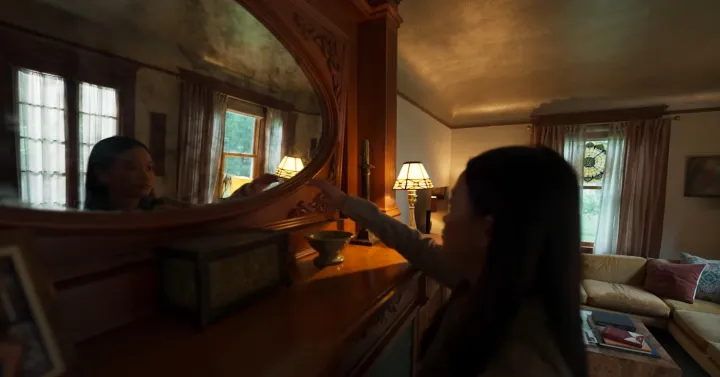
Famed director Steven Soderbergh has returned to cinemas with an interesting new horror concept. Presence introduces us to the Payne family as they move into a new home. The family’s matriarch Rebecca (Lucy Liu) views it as an opportunity to get her beloved first born son Tyler (Eddy Maday) into a prestigious high school while her husband Chris (Chris Sullivan) worries about the effect it will have on their daughter Chloe (Callina Liang) as she still grapples with the overdose deaths of two of her high school friends. As the family battles with their internal conflicts, they soon discover that they’re not alone in the house.
The concept of the film is to present the story of a haunting from the vantage of the ghost instead of those being haunted. Soderbergh utilizes first person camera perspective to provide the audience with the eyes of the ghost in the Payne’s home which creates an immersive experience that feels like it places you directly into the film. The camera moves just as a sentient being would, up and down stairs, looking their windows, lingering around people. The movement leans more natural and not like shaky cam, preventing a disorienting viewing experience that would otherwise take someone out of the film and away from focusing on the screen and the story being told. It’s an interesting visual component that’s intimate not just in what you see, but in how viewers experience Presence’s characters.
Due to the perspective of the film being that of an unseen entity, the ghost’s visage allows the audience to drop in on the family’s private and more intimate moments; times where they think they are privately confiding in a friend about relationship troubles or crying by themselves during a moment of solitude. We’re given a window into their raw emotional states and their conflicts with each other that allow for a thorough fleshing out of their personalities, histories, and emotions in an efficient time period of just a scene or two. The end result makes for well developed characters and a visceral understanding of who they are and the trauma they’ve faced or are currently experiencing. It’s a well done melding of storytelling and cinematography that feels fresh and fleshes the film out in a creative way.
Trauma is a central theme in the film not just in terms of Chloe dealing with the deaths of her friends , but for the entity itself who is drawn toward those experiencing trauma, making itself increasingly known depending on how much grief and pain the human subject is dealing with. This is an interesting wrinkle with notable payoff as the film continues on, culminating in Presence’s strong climax. The final 20 minutes is what makes the film as all of its elements come together and are presented to the audience in a way that is excruciating and exhilarating in the tension it builds as you wait to see how the conclusion unfolds, and feels rewarding for the buildup that has been established throughout its runtime. The result is an interesting concept for a film that pulls you in and doesn’t overstay its welcome with a tight 80 minute runtime. Presence is a pleasant theatrical surprise that is worth a spot on anyone’s watchlist.
Image: NEON

